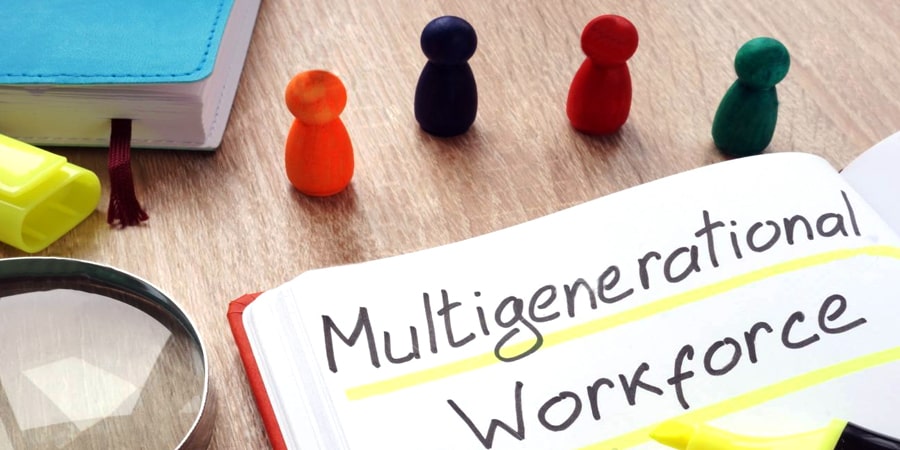
The Multi-Generational Workforce: An Employer’s Guide to Managing Millennials, Generation X, and the Baby Boomers
Today, three generations dominate the workplace: the Millennials, Generation X, and the Baby Boomers. They range in age from 22-73 years old and represent 93% of the workforce. With an age gap of 50+ years, these workers bring distinct challenges, strengths, and expectations to the workplace. Identifying and adapting to these differences is key to effectively managing a multi-generational staff.
Who Are the Millennials?
The Pew Research Center defines Millennials as those born between 1981 and 1996. By the end of 2019, they will overtake the Baby Boomers as the most populous generation. They already make up the majority of the workforce, at 35%. That number will rise to 75% by 2025.
Millennials came of age during the Digital Revolution, and are known for their technological savvy. They are more likely to hold a bachelor’s degree compared to prior generations at their age. Typically, they do not pursue traditional goals, such as homeownership, financial stability, and raising a family. They are more likely to cite wealth, travel, and personal fulfillment as their top priorities.
Millennials: Key Strengths and Challenges
Gallup Research, an American analytics firm, identified three traits unique to this demographic:



Job-hopping: Sixty percent of Millennials are open to a new job opportunity. This is good news for recruiters. However, for employers, it suggests over half of their young employees don’t see a future with them. A recent Gallup poll reported that 21% of Millennials changed jobs in the past year — more than three times the rate of older generations.



Team-oriented: They are a social generation, befriending coworkers and supervisors alike. Throughout their education, they’ve learned the importance of teamwork. They prefer to work in collaboration because it is familiar, fun, and doesn’t incur much risk. Taking on sole ownership of a project can feel intimidating to Millennials.



Values-driven: Millennials care about their employer’s mission and whether it aligns with their values. According to the 2019 Deloitte Global Millennial Survey, over half of young workers turned down a job offer because they didn’t agree with the company’s standards.
Millennials are looking for a sense of purpose in their work. Almost 75% report that “making a difference” is essential to their job satisfaction. Personal growth is also a priority, and opportunities to learn and improve may help retain them as employees.
Managing the Millennials
The majority of Millennials grew up in a structured, sheltered environment. The Journal of Higher Education described their upbringing as “buckled, watched, fussed over, and fenced in by wall-to-wall rules and chaperones.” Not surprisingly, they rely heavily upon their supervisors. They prefer strong, personal relationships with their boss and require continuous feedback. Poor communication and lack of support from managers is the top reason they leave their job.
Millennials also prefer a more democratic work environment versus a traditional hierarchy. They want every idea to be heard regardless of seniority or credentials.
The following strategies can help companies attract and retain younger employees:
- Open-plan offices and coworking spaces
- Group projects
- Frequent staff meetings
- Opportunities to socialize outside the workplace
- Friendly relationships between superiors and subordinates
- Ongoing feedback versus the traditional quarterly review
- Regular communication from managers, using modern platforms such as online chat and collaboration software
- Listening to everyone’s ideas and opinions regardless of rank
- Maintaining an open flow of information
- Developing an online presence (e.g., website, social media) that communicates the company’s mission and culture
- Diverse and inclusive hiring practices
- Community outreach and volunteering
- Developing mentoring programs
- Providing opportunities for continued education, training, and travel
Who Belongs to the Generation X?
Generation X was born between 1965 and 1980. They are more materialistic and career-oriented than previous generations. Most take an individualistic approach to work. This generation is considerably smaller than the Boomers and Millennials. Nonetheless, Gen Xers hold a great deal of power. They currently occupy 51% of all leadership positions globally. Those numbers will increase as more Baby Boomers retire.
Though the Millennials are labeled the “digital natives,” research shows Gen Xers are just as comfortable with technology. According to a 2015 study by Sage Group, Generation X founded most tech startups, and they are the largest consumers of online goods and social media.
Generation X: Key Strengths and Challenges



Experienced and Educated: Millennials are often lauded as the most educated generation, which is true for their age group. However, many Gen Xers returned to school later in life, and 35% now hold a bachelor’s degree — 1% lower than Millennials. Furthermore, the average Gen Xer has spent 20 years in the labor force.
Despite being primed for managerial and executive positions, they are often overlooked for promotion. In 2018, the Harvard Business Review surveyed over 25,000 leaders around the world. In the last five years, 66% of Gen X leaders received one or no promotions. The majority of Millennials and Baby Boomers received 2 or more promotions in the same period.



Digital savvy: Despite preconceptions, Generation X is equally competent with technology. Most Gen Exers didn’t grow up with a computer, but they have spent their career using one. In a 2018 poll by CNBC, 54% of Gen Xers and 56% of Millennials reported they were comfortable using technology in the workplace. The majority of both generations access the Internet daily, with Gen Xers spending 40 minutes more online each week.



Soft-Skills: Generation X demonstrates more patience and cooperation than their younger cohort. They are generally independent, entrepreneurial, and have strong problem-solving abilities, making them ideal leaders. Their communication skills are also excellent, as they can effectively communicate both in person and through digital platforms.
Managing the Gen Xers
Generation X is motivated and self-sufficient. They don’t require a great deal of oversight and may balk at perceived “micro-management”. They make loyal employees. However, their loyalty lies more with individuals than the company itself.
They like to be recognized as leaders themselves, either through advancement or mentorship. According to the Pew Research Center, 62% of Gen Xers said they would like to mentor younger coworkers.
Some strategies to retain these seasoned workers are:
- Providing a clear path to advancement
- Ensuring hard work is well-compensated
- Avoiding micromanagement
- Utilizing their strong problem-solving abilities with challenging work
- Creating strong relationships with management and coworkers, based on respect
- Offering attractive retirement packages
- Providing the opportunity to mentor
Who Are the Baby Boomers?
After WWII, there was a dramatic rise in birth rates known as the “baby boom”. Born between 1946 and 1964, Baby Boomers are currently in the last stages of their careers or preparing for retirement. Over the next 15 years, the average business will lose 30-40% of their employees to retirement.
Yet Boomers still remain in the workforce longer than their predecessors. Forbes reported that 61% plan to continue working past age 65. A solid 40% plan to “work until they drop” according to the American Association for Retired Persons (AARP). This is in part because Boomers are living longer, healthier lives. For others, it is a financial necessity. Many Boomers lost their retirement savings in the 2008 Financial Crisis, forcing them to work longer than expected.
Baby Boomers are not as comfortable leveraging technology in the workplace compared with younger generations. However, even the youngest Boomers have 30+ years of work experience. Their soft-skills are also impressive. A poll of 1,815 adults identified them as the generation with the strongest work ethic, moral values, and respect toward others.
Baby Boomers: Key Strengths and Challenges



Looming retirement: As Baby Boomers retire, they must not take their skillset and specialized knowledge with them. Managers should have a succession strategy in place.
An additional challenge is that Baby Boomers aren’t always forthright about their retirement plans. In many cases, they face an uncertain financial future. They may prefer to phase into their retirement, versus committing to a set date. Part-time work or consultancy can be an attractive option for employees not quite ready to leave the workforce.



Work ethic: Researchers labeled the Baby Boomers the “original workaholics“. They were the first generation to prize their career over more traditional values of home and family. Boomers work hard for professional advancement and prestige. They report feelings of low self-worth in periods of unemployment. While Millennials are characterized as the “distracted generation,” Boomers are noted for their focus and follow-through.



Less comfortable with technology: If Millennials are digital natives, Baby Boomers are digital immigrants. They grew up without smartphones, computers, the Internet, and most of the modern technology found in today’s workforce. While 74% of Millennials think new technology improves their lives, this holds for only 18% of Baby Boomers.
Managing the Baby Boomers
Baby Boomers present a unique set of problems for the employer. As Baby Boomers prepare for retirement, it is crucial to plan for succession and retain knowledge. Those that remain in the workforce may benefit from technology training and more flexible work arrangements.
Tips for managing Boomers through both work and retirement include:
- Establishing cross-training programs between younger and older workers
- Creating a database of their organizational knowledge
- Offering part-time jobs or consultancy
- Telecommuting options
- Creating mentorship programs
Bridging the Generational Divide in Today’s Workforce
The three generations vary widely in age, attitude, and skillset. There is no one-size-fits-all approach to managing them. For less friction and more productivity, it’s better if managers adapt their style to suit each generation. Mentoring programs and cross-training can foster relationships between the generations. If managed with insight, having such a diverse staff can bring an astonishing array of talent to one’s business.

